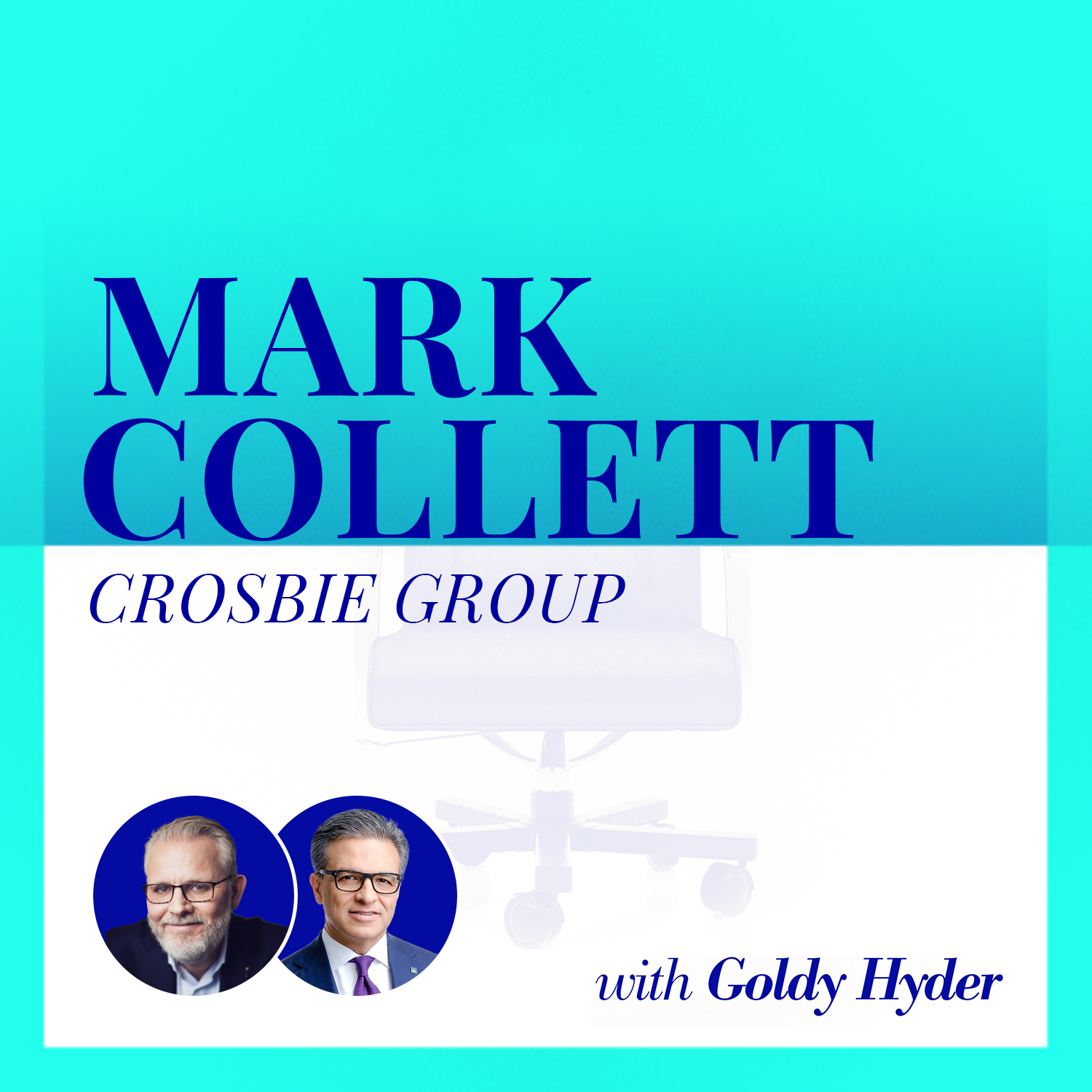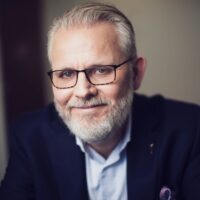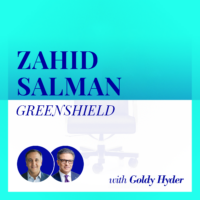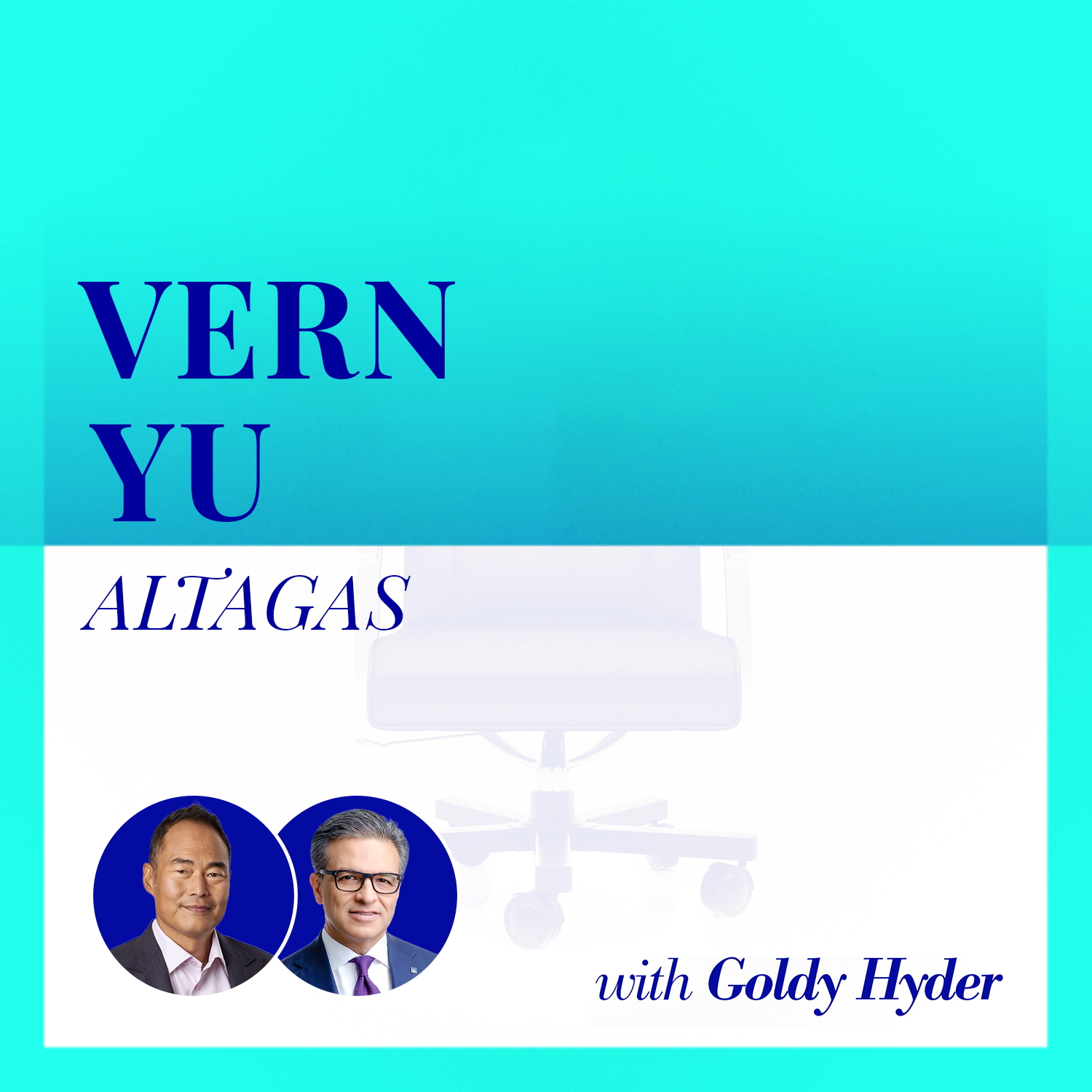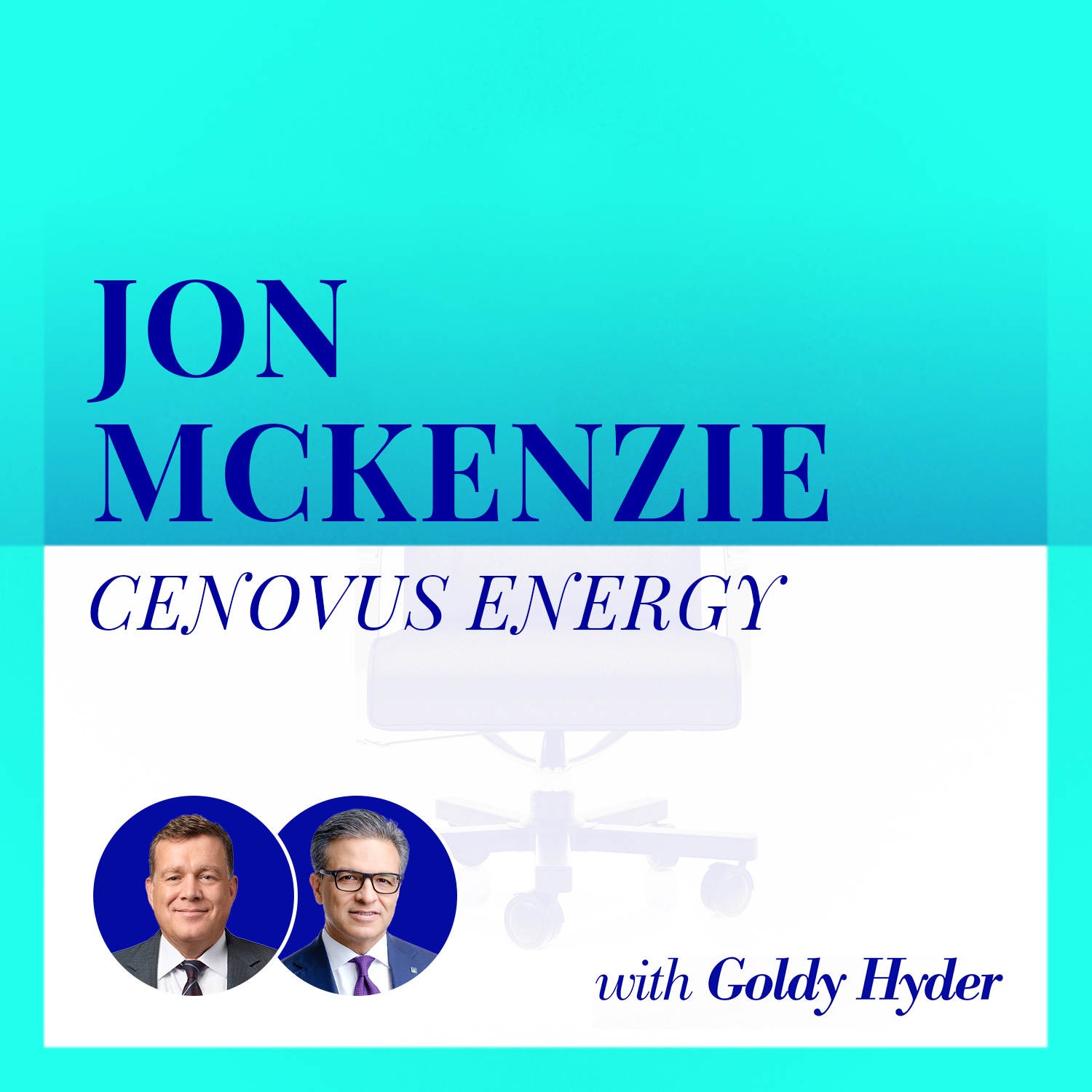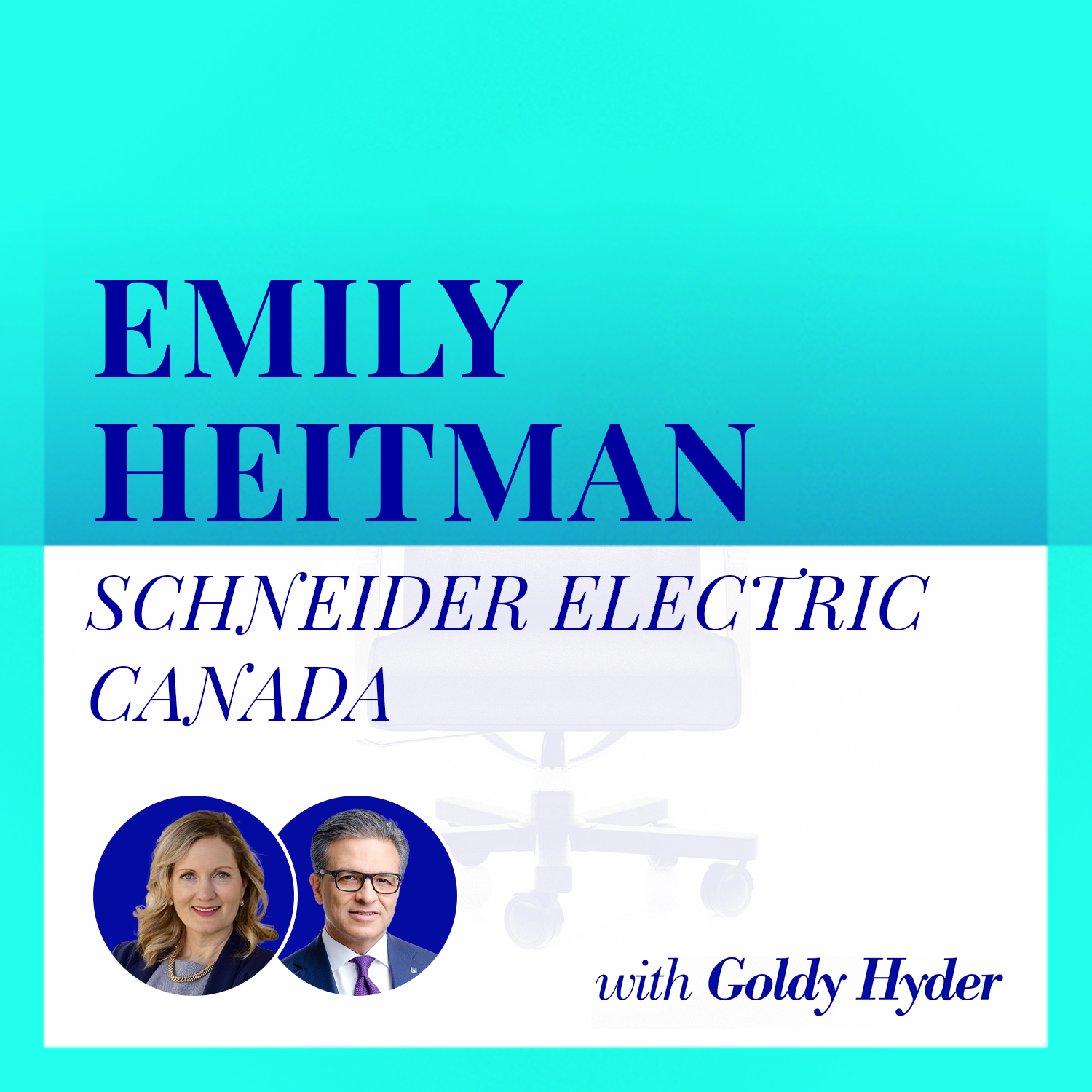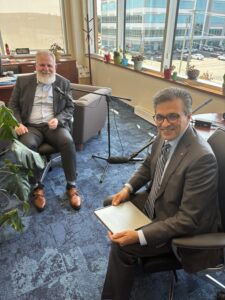 Mark Collett remembers a time when many Newfoundlanders and Labradorians left the province in search of work, including himself. But today, as the CEO of St.John’s-based Crosbie Group, he sees a different story unfolding.
Mark Collett remembers a time when many Newfoundlanders and Labradorians left the province in search of work, including himself. But today, as the CEO of St.John’s-based Crosbie Group, he sees a different story unfolding.
“Certainly for the first 30 years of my life, I think we were probably hanging our head a little bit low,” he tells Goldy Hyder on the Speaking of Business podcast. “But I think we started to pump our chest out when things really started to move ahead in the oil industry.”
Crosbie Group, a fourth-generation family business, plays a central role in the energy, marine and real estate sectors in Canada, the United States and Guyana. Collett has seen firsthand how quickly other countries have moved ahead with energy projects, while those in Canada have stalled. “From 2014 to 2018, there were over $4 billion in commitments to explore offshore Newfoundland and Labrador,” he notes. “Since 2018, there’s been just $300 million.”
He attributes much of that slowdown to regulatory uncertainty. Despite the challenges, he believes the tide may be turning. “We need to seize the moment, seize the day,” he urges. “We have a very willing sentiment toward the industry right now.”
For Collett, the conversation isn’t just about energy, it’s about Canada’s future. “We spend an awful lot of time talking about our potential and tomorrow,” he says. “I’m personally at a place where I want to see things happening and happening now.”
🎧Listen to the full conversation with Mark Collett on the Speaking of Business podcast.
Mark Collett:
We spend an awful lot of time talking about our potential and tomorrow, and I’m personally at a place where I want to see things happening and happening now.
Goldy Hyder:
Welcome to Speaking of Business, conversations with innovators, entrepreneurs, and leaders. I’m Goldy Hyder, president and CEO of the Business Council of Canada. I’m speaking to you from beautiful St. John’s Newfoundland at the headquarters of Crosbie Group. The fourth generation family business is at the forefront of what makes Newfoundland and Labrador such a dynamic place. Crosbie plays a central role in the energy, marine and real estate sectors and it’s having an impact not only here in Canada, but as far away as Guyana. Mark Collett is Crosbie’s CEO and I’m very pleased to be able to speak with him today. Welcome to the podcast, Mark.
Mark Collett:
Thanks for having me, Goldy.
Goldy Hyder:
Well, look, it’s great to be here with you my second time back in this beautiful province in the last little while, and a lot of Canadians are starting to get more curious about our country. Tell them first and foremost about why they should be checking out Newfoundland and Labrador as part of their travels this year.
Mark Collett:
I mean, it’s a pretty special place. I mean, I’ve lived here most of my life. I lived away for about 10 years, but I moved back home in 1999 and I haven’t looked back. There’s something about Newfoundland and Labrador, the sense of place here that I’ve never felt anywhere else that I’ve been, and I think-
Goldy Hyder:
You’re originally from the UK, right?
Mark Collett:
No, I’m originally from St. John’s.
Goldy Hyder:
St. John’s?
Mark Collett:
Yeah, born and bred. I’ve lived around a little bit.
Goldy Hyder:
Why did I think that you were from the UK?
Mark Collett:
Studied in the UK.
Goldy Hyder:
You studied in the UK?
Mark Collett:
Yeah.
Goldy Hyder:
So you went away?
Mark Collett:
I went away, yeah. I went away to university in Nova Scotia and then subsequently I was in the UK. I was in Toronto for a few years as well.
Goldy Hyder:
You know, most people don’t come back, right?
Mark Collett:
There are two kinds of Newfoundlanders. There’s those who live here and those who want to come back. People say that all the time and it is just such a special place and anywhere I’ve been, I’ve always had this longing to come back and I think there’s very few places in Canada that are so distinct like that where people say, “I need to find my way back.” And part of it I think is over certainly in my lifetime. I mean, I’m 54 years old and certainly for the first two to three decades of my life, I saw nothing but people leaving the province and, frankly, things turned around in the late nineties in a pretty profound way and I saw a lot of friends coming back and I wanted to be part of that.
Goldy Hyder:
Obviously, when people were leaving, they were leaving because they were pursuing opportunities somewhere else and that it was often driven by adversity. Has that changed here in Newfoundland now?
Mark Collett:
A good friend of mine said to me years ago, “Mark, even the Vikings left Newfoundland.” And I like to say that, well, they weren’t tough enough to stick it out. This adversity for sure. There have been ups and downs in our economy. We saw it in the fishery. We’ve even seen it in the oil industry in the last 15 years, certainly with downturns that you would see in terms of Canadian business. People would mostly talk about what would happen in Alberta, but that happens here as well. But I think that in Newfoundland, we probably had, certainly the first 30 years of my life, I think we were probably hanging our head a little bit low, that things were really, really difficult. But I think we started to pump our chest out when we really figured, things really started to move ahead in the oil industry and there’s a pride that comes with that, that maybe for me anyway, that I started to see that more profoundly in the last 25 years and it was certainly there before, but Newfoundlanders are pretty proud people.
Goldy Hyder:
Not everybody can handle adversity and handle it well. What role has adversity, not just in where you’re from, but the work that you do, your own personal experience, how did adversity shape your career to get to where you’ve gotten to?
Mark Collett:
I’ve known my whole life that I wanted to find my way here. I also knew that I was better off leaving and seeing new things and seeing different ways of doing things and bringing it back. I don’t know if I can call that adversity, but it was certainly something that was always in me. My dad was like that, Dad went away and studied engineering and came back and made his career here, so I could always see that that can be done, but there is certainly a tradition, a well-known tradition of Atlantic Canadians, I won’t just say Newfoundlanders and Labradorians, but of Atlantic Canadians making their way west.
When I was growing up, it was Toronto and then certainly in the eighties, late eighties, that turned to a more profoundly heading west to Fort McMurray and other areas of the oil patch. I always wanted to do it here. I think there’s a lot of people like me that just have that determination in them and to try to make a go of it here. Now, sure, folks can go elsewhere. There are greener pastures and there’s more opportunity on the mainland, as they say, but increasingly over the last 20 years, there’s a lot of opportunity here.
Goldy Hyder:
In my time here, the word that I’ve heard the most is actually resilience, and in some way that word applies not just to this province, but to our whole country right now. We’re under so much pressure and so much adversity. How prepared or how resilient do you think Canadians can be at this moment?
Mark Collett:
We spend an awful lot of time talking about our potential and tomorrow, and I’m personally at a place where I want to see things happening and happening now, because the last decade we’ve lost. I was reading just recently a report that talked about investment interest in the province in our offshore oil industry at a time when there is so much potential, we’re watching other jurisdictions around the world that are forging ahead. Norway is a brilliant example of, during COVID, they doubled down on their oil industry and they’re seen as leaders in renewable energy, but they’re also paying for it, paying for that transition.
Goldy Hyder:
Well they’re telling us not to use ours.
Mark Collett:
Fair enough. But you know, the last decade here in Newfoundland, we have seen little to no growth. In fact, we have started to fall behind in our offshore oil industry. Here’s just one small data point. From 2014 to 2018, there were over $4 billion in commitments made by 16 different companies to explore offshore Newfoundland and Labrador. Since 2018, there’s been $300 million in commitments. We’ve lost a decade. There was the provincial government of Newfoundland and Labrador in about 2018 put out a document called Advance 2030 where they wanted to get to 650,000 barrels a day. We are currently at about 240. There’s been no new developments brought on since then with some minor exception, but no major project.
Goldy Hyder:
Why is that though? What is it that…
Mark Collett:
Investor sentiment.
Goldy Hyder:
And that’s driven by?
Mark Collett:
Federal government, let’s just call it out. The regulatory burden here, no matter how much someone wants to dress it up, the regulatory burden here is enormous compared to other jurisdictions. Other jurisdictions have found a way to get to the same level of oversight, but to do it much more quickly and with certainty. You can’t change the rules of the game in the middle of it. We are active in other parts of the world. We’re in Guyana. Guyana discovered oil in 2015, Discovered it. Today they are producing, I believe it’s about-
Goldy Hyder:
1.5 million-
Mark Collett:
They’re about 600,000 barrels a day today.
Goldy Hyder:
They’re on track.
Mark Collett:
They have four FPSOs on site. The fourth just showed up earlier this year. They’ll be in production later this year. The fifth shows up next year. By 2027, they’ll be producing 1.2 million barrels a day. They found oil 10 years ago.
Goldy Hyder:
Yeah. So urgency, speed.
Mark Collett:
Yeah.
Goldy Hyder:
Right. Well, let’s drill down that a bit, but in order to do that, let me first make sure that the listeners are familiar with Crosbie. What does Crosbie do?
Mark Collett:
Yeah, as you mentioned the intro, it’s a fourth generation family business and over the last 120 years, the company’s been involved in all kinds of industries, industries that have sort of ebbed and flowed with the economic profile of the province. In the mid-nineties, the owners of the company made the decision that they wanted to forge the future in the offshore oil industry and went off to the North Sea in search of partners to help the company, the family at the time move into businesses where they could see there was an ability to quickly get into the business, to support offshore platforms, frankly, with the ability to employ Newfoundlanders with skills they already had.
So we are very involved in the provision of trade labour, scaffolding, scaffolders, insulation, insulators, crane operations, industrial coatings and so on. Exterior maintenance. We’re an industrial maintenance contractor. In about 2017, we made a strategic investment outside of the province in another company called MacKinnon & Olding, which provide all those same services, but we do it for the ship building and ship repair sector, so we’re very heavily now in support of the marine sector and in the offshore oil and gas sector.
Goldy Hyder:
In terms of the oil and gas side of the business, what’s different, of course, I’m an Albertan saying this, is you’re drilling offshore. What are the challenges you face when you’re offshore versus when you’re doing it, say in Alberta and the oil sands?
Mark Collett:
Yeah. Projects that are developed offshore Newfoundland and Labrador, have much longer time horizon. There is a lot more risk, there’s a lot more money involved. It’s the harshest weather environment you’re going to find anywhere in the world. It’s in a couple of hundred meters, in some cases a couple of thousand meters. In others it’s deep water, in some cases.
The order of magnitude is so much larger in terms of the risk profile and the amount of money that you’re talking about, but over the last 30 years, the industry’s proven that they can do that. They’ve figured that out and it’s done safely. The issue that we see here right now is, as I mentioned earlier, is investor confidence. This is a region that our local, the Crown-owned energy company, OilCo, has spent quite a bit of money, I couldn’t tell you an exact figure, but certainly a couple of hundred million over the last 15 years, investing in 3D seismic to prove the case that there are vast quantities of oil and gas that are waiting to be discovered to decrease that risk, to bring multinational energy plays to the province to attract interest. That interest was there, as I said earlier, in that four-year period from 2014 to 2018, $4 billion dollars. One company anted up for over $600 million and four years later they walked away from it, because they could not see a path. They’re not doubting that the oil is here, but to actually bring it to fruition in a timely manner, that’s been the problem.
Goldy Hyder:
Yeah. Now, you and I were just at a conference on energy held over the last three days here, and one of the speakers is the project lead for this project called Bay du Nord, which Canadians probably haven’t heard of, and I know you’re not directly involved in it, but tell me what that project like that would mean for Newfoundland and what your sense is about the support that it enjoys here in the province.
Mark Collett:
That’s a critically important project for our province and for our energy industry here. I certainly won’t speak for Equinor, but that first, that discovery was made in 2013 with another company, formerly Husky Energy was the partner there. Today, it’s BP. The project frankly is a 30-year extension of our energy industry here in the province. They will produce oil for the next 30 years at least.
Certainly when they get in there and they discover more, you expect there’ll be further tiebacks, but without it, I think we probably have seen the last major project here and we certainly have platforms here that’ll continue to produce for another 30 or 40 years, but without Bay du Nord, I think that’ll be the beginning of the end, to be quite honest. It is quite sad to say that.
Goldy Hyder:
This is a project that was specifically mentioned by the prime minister, by the premier in this recent First Minister’s meeting that was held in Saskatoon in early June. We’re in this backdrop of wanting to take control of our own destiny to some extent, because we can’t be all eggs in one basket with the Americans. Despite some of the challenges you’ve laid out, what you’re hearing, does it make you hopeful that just maybe we could get out of our own way and get some stuff done?
Mark Collett:
Absolutely. Equinor and their partner, you can tell just by talking to their leadership, they want this project to go, but it has to go in a way where it fits the investment profile that they need internally to go through their review processes. The supply chain that’s here in the province is second to none, that we’ve got a supply chain here now that’s been doing this for 35 years that can support that project. The hurdles are, it always comes back to how much does Canada want it?
I do think though, where at a moment in time where we need to seize the moment, seize the day, that I do think that we have a very willing sentiment toward the industry right now. We have, when you talk about nation-building projects, this is one of them. This is on the list. If we can get out of our own way, I hope all of the… Certainly the indications that are out there, the rhetoric that’s out there seems to point in the direction that this is one of them that should make the cut. I just really hope it does.
Goldy Hyder:
Well, you mentioned rhetoric. I mean, one of the things that has held us back has really been this inability to use the word “and” when it comes to the economy and the environment or energy and climate change. You had wrote a piece some time ago in which you lamented that we have become too polarized between the need to decarbonize and the need to harness oil and gas resources, and you said, and I quote, “We can have it both ways.” What do you mean by that?
Mark Collett:
That’s about four years ago, I think, that I wrote that and that came about, to be quite honest, this was on the heels of Newfoundland and Labrador’s debt has been on my mind and it’s been on my mind for years. I’ve watched it go from about five and a half to $6 billion in 2005-ish to today it’s nearly $19 billion and so a few years ago I wrote that article because there was just such a polarization out there. It was if you work for the oil industry, then you are against the environment, and it was everywhere.
And I had written an article previously when I was the chair of the board at Energy NL, at that time it was called NOIA, where we were talking about the importance of the industry. The folks down at NOIA were very helpful in pulling that together with me, and then subsequently I just got the urge to write something else and there was an audience for it. And my point is this, the offshore energy industry, the oil industry, let’s say that word, the oil industry, it’s not anti-environment.
If anything, some of the biggest environmentalists you’ll find in the country work for oil companies because they’re studying how to do… And they’re practicing it, how to harness the resources for the betterment of the country in a way that’s environmentally responsible and they’re doing it-
Goldy Hyder:
Isn’t that just good business? Isn’t that just make common sense?
Mark Collett:
It makes total common sense, and there was such a… It seemed to be the rhetoric out there amongst different camps suggesting that we need to stop our oil industry in the province, and I’m looking at it saying, “Are you kidding me? If there’s any silver bullet for our financial situation here, it’s our oil industry.” The royalties that can come from that industry and have come historically would handle it many times over. I could just see it slipping away and I was reflecting on it when I left in 19… I went away to university in ’89.
I graduated in ’93, I moved to Toronto. That was just before the industry really took off and so many of my friends were leaving and the kind of things I was hearing them talk about. Fast-forward 30 years and I’ll hear people talk about it again and I thought, “We’ve got this industry. It’s brought us so much, it’s enabled so much for our province. We are miles ahead of where we were and we’re going to let it all slip through our fingers.”
The oil industry in Canada has found a way to harness a resource that we are in abundance of in extremely responsible ways. There’s no country in the world that is more responsible than we are. So when I say we can have it both ways, we can have it both ways. There’s no reason why we shouldn’t be doing this. It is to our gain as a country, and frankly, it’s going to get produced somewhere. It should be Canadian oil that’s being produced.
Goldy Hyder:
One of the other things that certainly the industry I think doesn’t get enough credit for is the role and the importance that it gives to innovation, that how much innovation helps in addressing some of these challenges. How do you as an organization continue to evolve, to grow, to learn and to innovate?
Mark Collett:
In many cases, we’re taking our lead from our clients and working with them closely to see where can we go together in terms of the services that we’re offering? We’re seeing, for example, a movement towards offshore production platforms that have far fewer people offshore. We will adapt to that. They’re doing that for all kinds of great reasons. At the top of the list safety, it’s certainly safer to have fewer people offshore. We provide people and equipment, but we’re moving in those directions where we’re starting to adopt technologies that can enable that. So that’s certainly part of the transition that we’re going through and we want to be an active partner with our clients along those lines.
Goldy Hyder:
Earlier on, you had mentioned you’re in Guyana. I mean, how did somebody sitting in St. John’s, Newfoundland, go, “You know what we need to do is invest in Guyana.”
Mark Collett:
I still ask myself that question, but it’s been a heck of a ride and we’re really enjoying it. So in 2017, about that timeframe-
Goldy Hyder:
I guess at least they share your time zone or pretty close, give or take?
Mark Collett:
They’re on Eastern for part of the year, and they’re on Atlantic, so pretty close. They don’t use daylight savings time, so the path there was through our client, one of our biggest clients is here right in here in St. John’s, ExxonMobil. A wonderful company and ExxonMobil, they’d made us aware of what was happening down there. They had made a discovery in 2015, and it was just sort of a suggestion that maybe take a look down there and I think it was coming from a place where the local supply capacity, supply chain capacity was not there.
It was a brand new industry and it was just getting going. They found oil in 2015, so we went down in 2017, 2018 and identified a partner. We wanted to find a partner similar to where we were in the nineties, a family business that wanted to be a part of this industry and we, in this case, we’re going to play the international partner to come in and help set it up. We identified a partner in ’18. We hired quite a few people locally, brought in people from Newfoundland and Labrador to help train and we had a workforce ready to go and started bidding contracts and we were offshore for first oil in 2019.
There are four FPSOs there now, and we’re on all four, so it is going really well. The industry there is taking off and we want to be a part of it and it’s changing Guyana. Guyana has got a really interesting history that the parallels with Newfoundland and Labrador are uncanny. Weather aside, but we’re talking about, it’s a small country. It’s about 780,000 people.
Goldy Hyder:
Yeah, 800,000 people I think. Yeah.
Mark Collett:
Yeah, the diaspora, hundreds of thousands have emigrated over the last number of decades, many of whom are in southern Ontario. It’s kind of like Newfoundland is going to southern Ontario back in the seventies and eighties, and there was a decimation, there was some primary industries that the unemployment rate soared and then they found oil. It really is an unfolding of a story-
Goldy Hyder:
And it’s doing really well economically.
Mark Collett:
It’s doing really well, and they eclipsed Newfoundland’s production after their second FPSO. They’re racing ahead of us. They’re now producing at a level that’s about three times what we’re producing here and they’ll be four to five times in about three years time.
Goldy Hyder:
You know what’s interesting about what you just said, and it kind of struck me that it’s ExxonMobil, this is not a small company, this is a global giant, and when Guyana came to them, they thought of a company in St. John’s Newfoundland as being their best partner to going down there and doing the thing.
Mark Collett:
Well, I mean, I think it was more of a suggestion that say, “Hey, you’re a capable company.”
Goldy Hyder:
But doesn’t that say a lot about you, Crosbie, Canada? It’s a big deal.
Mark Collett:
Oh, I think so. I mean, to be quite honest with there’s been quite a few Newfoundlanders who work for ExxonMobil that have left working in St. John’s and gone to Guyana, similar profiles to the business, not as harsh in terms of the environment-
Goldy Hyder:
And as you said, the weather’s not too bad.
Mark Collett:
And the weather’s not too bad. I always say when I go down there, the most boring job in Guyana is the weatherman. It’s 30 degrees every day of the year. The wind blows from the east at 15 kilometers an hour.
Goldy Hyder:
Well, it’s a great story because I think part of these podcasts I’ve been doing for some time now is it’s the humility and the humbleness and we don’t even celebrate and make aware that, hey, we’re good at what we do, and even a global company says, “This is where I can get it done, get it done well.”
Mark Collett:
I mean that’s certainly one of the hallmarks of our company and I think of our province is humility and we don’t pump our chest out enough, but we’re pretty proud of what we’ve accomplished down there and we have a great partner that we’re really pleased. This kind of comes from the same DNA, so…
Goldy Hyder:
Let’s talk a little bit about your own journey. As you said, you were born and raised here. You left to go to Durham University in the United Kingdom. Then you’ve come back and you left the province and you’ve come back. Through this process as you grew professionally and started to think about yourself as a leader, do you remember those days when you thought, “Maybe I could be CEO one day, maybe I could be the head of a company.”
Mark Collett:
I don’t know that I said I was saying I wanted to be the CEO, but I did know that I wanted to make an impact and that was sort of, I come by that honestly, that was the way my father came up in his career. He was born in rural Newfoundland and he was a pretty bright guy growing up and decided he wanted to be an engineer and went away and became an electrical engineer and came back and he had a deep impact on our hydroelectric, our transmission system here and our provision of our generation of power here in Churchill Falls. That’s always been with me is I want to make an impact. And whether it was at the CEO level or not, I don’t know that I set out to be a CEO, but I did set out to say I wanted to be able to impact change in some small way on a place that I love.
Goldy Hyder:
Tell me about people along your journey that served as your mentors.
Mark Collett:
Oh, yeah. I got to be careful. I might get upset here, certainly my dad when I was starting out, and I’ve been very blessed over the course of my, I want to say my career of my life, to be exposed to people that took an interest in me and-
Goldy Hyder:
What did he teach you that you’re most appreciate?
Mark Collett:
Humility. It’s the number one thing I look for, and when I hire someone is humility and curiosity. People that are interested and want to do good work and don’t need to be the smartest person in the room. If you’re the smartest person in the room, you’re in the wrong room. And he certainly taught me that one. And then he passed away when I was in my early thirties. And as I moved along in my career, I’ve always, even prior to that, I had exposure to different folks and either through my family or through my career. And then I met Rob Crosbie and yeah, pretty special guy. He’s the chair of Crosbie, and he passed away just a few weeks ago. He was my mentor for 25 years, so he had a very deep impact on me.
I worked with him, like as I say, 25 years ago, and then I left a couple of years later and then about 10 years ago, he kind of came knocking on the door to say, “Hey, would you be interested in coming and helping out here?” And he was a man who really, he led with humility and he led with a deep love for the province and a way that it’s not just me. Everyone that works here, I think, carries that with them. So mentors have been a massive part of my journey.
Goldy Hyder:
What’s also a part of your journey is community, the chance to participate and to give back. I know that you sit on the board of the Canadian National Institute for the Blind. How did you get involved with that organization?
Mark Collett:
Serendipity. Your inbox in LinkedIn gets flooded and you don’t read everything that’s in there and then one day, I guess two and a half years ago, I happened to notice a note from a search firm that was looking for new board members for the CNIB and I thought, “This is very curious.” And they were going through a process of renewal on their board of directors, and I took a phone call and then I had a Teams call and I learned a little bit more, and I became completely captivated with what they do. They’re one of the oldest and most well-known nonprofits in the country.
But when I learned the statistics Goldy, there are two million Canadians who are blind or low vision in this country and about 30% of them are actively employed. Just think about that. The other 70% are potentially, and the statistics, I guess they do move around a little bit, but up to 70% of the client base or the folks that avail of the services of the CNIB aren’t working, but the average education of blind and low vision Canadians is higher than the average education in Canada.
The schools do quite a good job with the blind community in Canada, but where it falls down is when it’s time to go to work. This is something that I really took on, I thought, my goodness, there’s such an untapped resource there and we think about, at the Business Council, you poll CEOs all the time about what are your biggest challenges? Access to talent. Well, in the blind and low vision community in Canada and in other communities with similar challenges, there’s untapped talent in this country and that really lit me up. That got me very, very inspired to be a part of that group.
Goldy Hyder:
Well, thank you for sharing that. I’m going to ask you to share one other story and that is some time ago you decided to shave all your hair, and listeners may not see it, but you got a good set of hair, a good set of hair on your head there. You decided to shave it all off to support young people that were living with cancer. Tell me about that.
Mark Collett:
The best kept secret in Newfoundland, maybe in Canada is a little charity called Young Adult Cancer Canada. I say little, but their impact is huge. They’re based in St. John’s, but they’re a national non-profit started by a gentleman by the name of Jeff Eaton. He’s an old friend of mine. Jeff, when he was about 23, this was 25 years ago, 26 years ago, he was diagnosed with leukemia. And given, when you hear his story, given I believe a less than 5% chance this happened to him twice, he came back and he was cured.
He realized very quickly that in Canada, for the young adult, there weren’t a lot of supports for someone going through that, because it’s very different than, God forbid, if you or I would have a diagnosis. You’re going through a period of your life, you’re graduating from high school or university, you’re starting your first job, maybe you’re buying your first house, having a child, getting married, whatever.
And he saw an opportunity to fill a need and started a non-profit. He’s dedicated his life to it and he supports thousands of young Canadians between the ages of 18 and 39 across coast to coast to coast in Canada. Their mission is to support young Canadians living with, through and beyond cancer. So long story short is he has been an outspoken advocate of the oil industry. And back in 2020, we were going through COVID, of course, and the oil industry was on its back heel, especially here.
We had one platform that was on the verge of being shut in completely and a rally was organized. This rally was a labour rally, and I got a call and they just asked me if I would speak on behalf of our company about how much the industry has meant to us. And I was on the board at the time at Energy NL and the local energy association, and I said, “Look, the CEO is going to speak, and anything I say is going to be redundant. But what if you spoke to someone from the non-profit community?” Because this industry is so philanthropic, it is so important to the province. They asked me, “That’s a great idea. Do you have anyone in mind?” And I mentioned Jeff Eaton and he got up in front of several thousand people and was such an advocate for us at a time when, frankly, I think there’s some people that would shy away from that. He didn’t shy away and I just decided then that I wanted to find a way to help. And he did have, they have a fundraiser called Shave for the Brave where students or young people, or could be anyone in the community, goes and shaves their head and they raise a few thousand bucks, a few hundred bucks, whatever.
Goldy Hyder:
You didn’t raise a few thousand bucks. You raised several hundred thousand bucks.
Mark Collett:
Yeah, so what I did was I went to the operators, ExxonMobil and Suncor, Cenovus and Equinor and I said, “If you sponsor $10,000 each, I’ll go to every service company I can get my hands on in Newfoundland and ask them for five and shave my head.” And that’s what we did, and we raised $260,000.
Goldy Hyder:
Amazing.
Mark Collett:
But since that time, it’s taken off. We’ve done this three times now. We’ve raised about $820,000 for a small charity. But the impact it’s had has been profound and it was a way of saying thank you. So we’re planning on doing another one the fall.
Goldy Hyder:
Well, thank you for that, and thank you for getting us through the easy part of the podcast. That was all the easy stuff. The hard part is the ending here.
Mark Collett:
The rapid fire.
Goldy Hyder:
This is when we do the rapid fire stuff. So here we go. Do you have a favorite hockey team?
Mark Collett:
Right now? It’s the Edmonton Oilers.
Goldy Hyder:
Good answer.
Mark Collett:
To be fair, they’ve been a favorite of mine. Right back to Wayne Gretzky. So…
Goldy Hyder:
Good for you. I know you’re a foodie. We’ve talked about food before. What’s your favorite food?
Mark Collett:
My favorite food? Well, I love a good barbecued steak. If I’m in a restaurant, it’s going to be the halibut.
Goldy Hyder:
All right. Favorite food to cook?
Mark Collett:
Yeah, that would be barbecued steak, for sure.
Goldy Hyder:
That’d be the barbecued steak. All right, so note to self, get invited for a barbecued steak. What’s one of Newfoundland and Labrador’s delicacy that everyone should try?
Mark Collett:
Cod tongues.
Goldy Hyder:
Oh, okay. Really?
Mark Collett:
Oh, they’re fantastic. Yeah.
Goldy Hyder:
Why is that the best delicacy?
Mark Collett:
Well, there’s many, but cod tongues… I mean, I would say it’s also something that’s very unique for someone that’s coming from away that hasn’t had the opportunity to enjoy it. But it’s frankly, if I’m in a restaurant and on the menu, the appetizer is cod tongues, I’m having the cod tongues.
Goldy Hyder:
How are they made?
Mark Collett:
Fried. They’re fried, yeah. It’s probably not something you’re going to eat every night.
Goldy Hyder:
Now I’m here, of course, with you in Newfoundland. What’s a hidden gem? If I had time to go and see something, everybody would say, you must see it.
Mark Collett:
Quidi Vidi. There’s an area just right off the ocean called Quidi Vidi Gut. There’s a wonderful local microbrewery there called Quidi Vidi Brewing. You’re overlooking the ocean. It’s just fascinating. It’s fantastic. You’d love it.
Goldy Hyder:
What’s your favorite way to spend a Saturday?
Mark Collett:
A long hike in the morning and in the afternoon, my wife and I will take our dogs out for another couple of hours and then a barbecue that evening with a nice glass of red wine.
Goldy Hyder:
Sounds good. Are you a reader? Podcast or reading?
Mark Collett:
I love podcasts.
Goldy Hyder:
Who do you listen to?
Mark Collett:
Craig Dowden. Do Good to Lead Well.
Goldy Hyder:
Do good to Lead Well.
Mark Collett:
Yeah, it’s a wonderful podcast. He’s always got me every Thursday morning when I go out for my morning walk, that’s who I’m listening to.
Goldy Hyder:
And now Speaking of Business, right? Exactly.
Mark Collett:
Absolutely.
Goldy Hyder:
Sorry, that’s a shameless promo.
Mark Collett:
No, but I am regular listener.
Goldy Hyder:
Shameless promo. Yes, you do. Listen, I know. Favorite place to travel to?
Mark Collett:
Two places, Norway and Scotland.
Goldy Hyder:
Why?
Mark Collett:
They’re a world away, but I feel like home. They’re just beautiful scenery, wonderful people. Just wonderful places to visit.
Goldy Hyder:
All right, let’s wrap up with the… I’m starting to think more about these days, but what’s on your bucket list?
Mark Collett:
When I turned 50, my wife and I were supposed to go to Italy, and that was in 2021. It didn’t happen for obvious reasons. I want to rent a villa in Tuscany and just kick back for 10 days, have wonderful Italian food and red wine.
Goldy Hyder:
Well, look, given how hard I know you work, you deserve that and it sounds like your wife does for sure.
Mark Collett:
Yeah.
Goldy Hyder:
Thank you for doing this, Mark. It’s been really a delight to chat with you and get to learn a little bit more about not just you, but Crosbie Group and Newfoundland and Labrador itself. You shared and I think Canadians are richer for it.
Mark Collett:
Thank you for having me, Goldy. And look, thank you so much for what you do with the Business Council of Canada. It is a service to the business community, but it’s a service to Canada, and I know that’s what drives you. So thank you very much.
Goldy Hyder:
Mark Collett is the CEO of Crosbie Group. If you would like to hear more of our Speaking of Business conversations with innovators, leaders, and entrepreneurs, why not subscribe to our podcast? Search for Speaking of Business, wherever you get your podcasts or go to our website at thebusinesscouncil.ca/podcast. And yes, it’s The Business Council.
Speaking of Business is a production of the Business Council of Canada. Our thanks to Luke Quinton in St. John’s for his help with this episode. And as always, thank you to Will McIntyre and the team at Pop-Up Podcasting in Ottawa. Until next time, I’m Goldy Hyder. Thanks for joining us.







